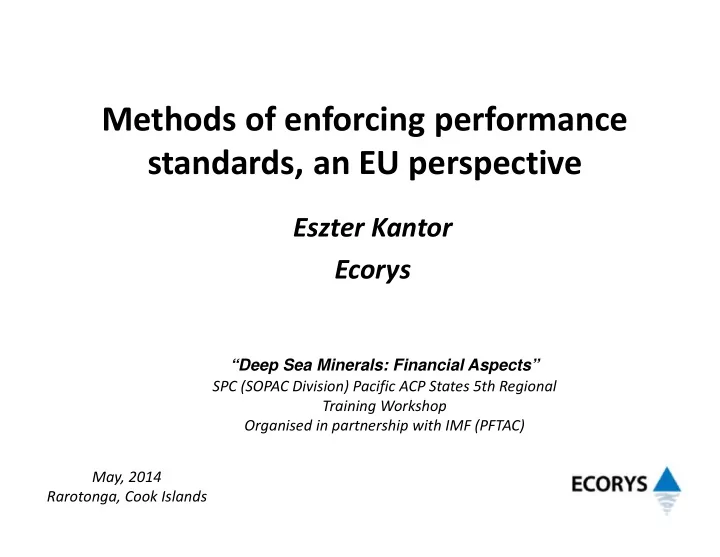

Methods of enforcing performance standards, an EU perspective Eszter Kantor Ecorys “Deep Sea Minerals: Financial Aspects” SPC (SOPAC Division) Pacific ACP States 5th Regional Training Workshop Organised in partnership with IMF (PFTAC) May, 2014 Rarotonga, Cook Islands
Ecorys Independent research and consultancy 500 people in 17 offices worldwide 2000 associates Working for international organisations, governments, NGOs and the private sector Holding over 50 framework contracts with the European Commission, Parliament and EIB
DSM: EU focus (1/2) Main priorities: jobs, growth, sustainability and security of supplies Recycling is not enough Deep Sea Mining is a Member State priority It will happen - EU needs to take position Research and development can identify good practices EU support for companies: environmental and social standards/requirements
DSM: EU focus 2/2 No intention of over-regulating the industry Ensuring transparency of operations EU Communication in the second half of 2014 Practical tools: code of conduct, standards, certification scheme EU remains open to exchange of information, advice and support http://ec.europa.eu/eusurvey/runner/seabed _mining
Marine Strategy Framework Directive (1/3) Currently working on a process to identify operational targets for good environmental practices (using the MSFD as a guide) MSFD focus: Protect the marine environment across Europe Achieve Good Environmental Status (GES) of the EU's marine waters by 2020 Uses 11 descriptors for GES
Marine Strategy Framework Directive (2/3) 1. Biodiversity is maintained 2. Non-indigenous species do not adversely alter the ecosystem 3. The population of commercial fish species is healthy 4. Elements of food webs ensure long-term abundance and reproduction 5. Eutrophication is minimised 6. The sea floor integrity ensures functioning of the ecosystem 7. Permanent alteration of hydrographical conditions does not adversely affect the ecosystem 8. Concentrations of contaminants give no effects 9. Contaminants in seafood are below safe levels 10. Marine litter does not cause harm 11. Introduction of energy (including underwater noise) does not adversely affect the ecosystem
Marine Strategy Framework Directive (3/3) Member States draft marine strategies: An initial assessment of the current environmental status of that Member State’s marine waters; A determination of what Good Environmental Status means for those waters; Targets and indicators designed to show whether a Member State is achieving GES; A monitoring programme to measure progress towards GES; A programme of measures designed to achieve or maintain GES.
Standards/Certification Scheme Standards on DSM technologies and trading practices Certification scheme Voluntary or mandatory Self-assessment or third party audit Setting minimum standards or identifying top performers
The aim Ensuring responsible behaviour Clear and transparent financing (avoid sources from conflict areas): An example is the initiative proposed in March 2014 by Catherine Ashton, High Representative of the EU for Foreign Affairs and Security Policy: responsible trading strategy for minerals from conflict zones DSM initiative would likely to contain softer measures
Responsible trading strategy for minerals from conflict zones Package of measures will make it more difficult for armed groups in conflict-affected and high-risk areas to finance their activities through the mining of and trade in minerals. The focus of the approach is to make it easier for companies to source tin, tantalum, tungsten and gold responsibly and to encourage legitimate trading channels.
Measures proposed under the responsible trading strategy 1/2 Draft Regulation: EU system of self-certification for importers of tin, tantalum, tungsten and gold Self-certification requires EU importers to exercise 'due diligence' in line with the five steps of the OECD Due Diligence Guidance The Regulation gives EU importers an opportunity to ensure clean supply chains
OECD Due Diligence Guidance
Measures proposed under the responsible trading strategy 2/2 Public procurement incentives for companies selling products such as mobile phones, printers and computers containing tin, tantalum, tungsten and gold; Financial support for SMEs to carry out due diligence and for the OECD for capacity building and outreach activities; Visible recognition for the efforts of EU companies; Policy dialogues and diplomatic outreach with governments in extraction, processing and consuming countries; Raw materials diplomacy including in the context of multi- stakeholder due diligence initiatives; Development cooperation with the countries concerned; Support by EU Member States through their own policies and instruments.
Visible recognition In order to: increase public accountability of smelters and refiners, enhance supply chain transparency and facilitate responsible mineral sourcing. The EU aims to publish an annual list of EU and global 'responsible smelters and refiners'.
Other elements Financial institutions set standards regarding the environmental and social impacts of the projects they finance. IFC standards on environmental and social sustainability Equator Principle The inclusion of these standards is yet to be addressed.
Key Points EU position later this year Ensuring responsible environmental and trading practices Possibilities: code of conduct, minimum standards or certification scheme Other enforcement methods may have to be tailored for deep-sea mining Our reports are online on the DG MARE Maritime Forum
Thank you very much for your attention Eszter Kantor eszter.kantor@be.ecorys.com
Recommend
More recommend